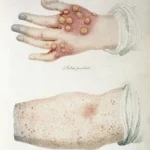A groundbreaking cancer treatment that works like a “Trojan horse” to destroy cancer cells from within is now available on the NHS in England. This marks a world-first approval that could transform treatment for thousands of blood cancer patients.
The therapy, called belantamab mafodotin (brand name Blenrep), specifically targets multiple myeloma, an incurable blood cancer affecting plasma cells in bone marrow. About 1,500 patients in England each year are expected to benefit from this innovative treatment.
How Does the ‘Trojan Horse’ Therapy Work?
The treatment gets its “Trojan horse” nickname from its clever way of attacking cancer. Just like the wooden horse from Greek mythology that smuggled soldiers into Troy, this drug sneaks powerful cancer-killing medicine directly into cancer cells.
Belantamab mafodotin combines two main parts: an antibody that targets a specific protein (BCMA) found on myeloma cells, and a toxic drug payload. The antibody part finds and attaches to cancer cells, and then the entire complex is absorbed into the cell. Once inside, it releases its toxic payload, killing the cancer cell from within.
This targeted approach allows doctors to deliver much higher doses of cancer-killing drugs directly to cancer cells while minimizing damage to healthy cells.
Life-Changing Results for Patients
Clinical trials showed remarkable results. After one year, 71% of patients receiving the belantamab mafodotin combination remained free from disease progression, compared to just 51% of those on standard treatments. This means an additional 20 out of every 100 patients stayed progression-free at the one-year mark.
The evidence also suggests patients may live longer overall. The trial showed a three-year survival rate of 74% in the belantamab mafodotin group compared to 60% in the standard care group, though the study is still ongoing.
Paul Silvester, a 60-year-old patient from Sheffield, experienced these benefits firsthand. After being diagnosed with myeloma in 2023, his initial treatment failed. He then received belantamab mafodotin through an early access program at the Royal Hallamshire hospital.
“I feel like this treatment has brought the party balloons back in the house. It has been amazing – within the first two or three weeks, after the first dose, I was in remission,” he said.
For Paul, the treatment means spending more time with family and enjoying life again. He’s now planning visits to historical sites like Hadrian’s Wall and looking forward to watching one of his daughters graduate.
“Most people say ‘you look really really well’… I have a good normal life,” Paul told the BBC.
Similar Posts
Who Will Benefit?
Multiple myeloma affects immune system cells called plasma cells, which are made in the bone marrow. While the cancer can’t be cured completely, this new treatment significantly extends the time patients can live without their disease getting worse.
The treatment has been approved for adults with multiple myeloma who have had one previous treatment containing lenalidomide, and whose cancer has either become resistant to lenalidomide or who cannot tolerate it.
Around 33,000 people are living with myeloma in the UK. The new drug will be used when first-choice therapy fails.
How the Treatment Is Given
The treatment combination consists of belantamab mafodotin given as an infusion, alongside bortezomib (given as an injection) and dexamethasone (usually taken as tablets).
The infusion takes about half an hour. Some patients receive it every two monthsk, while others get it every three weeks, as research continues to determine the most effective schedule.
Side Effects
While the therapy is generally kinder than other cancer treatments, it isn’t free from side effects. After a cancer cell has been destroyed, the remaining chemotherapy drug can leak into the body. This can cause dry eyes and blurred vision.
These side effects are usually manageable with regular monitoring and adjustments to treatment if needed.
A World-First Approval
England is the first healthcare system in the world to roll out this drug, following approval by the National Institute for Health and Care Excellence (NICE).
Shelagh McKinlay, director of research and advocacy at the blood cancer charity Myeloma UK, said: “We have been working very hard for the last year to get this treatment approved and we know it will transform the lives of thousands of people with myeloma.”
The treatment will be available immediately through the Cancer Drugs Fund once final guidance is published.
Helen Knight, director of medicines evaluation at NICE, said: “This recommendation demonstrates our commitment to getting the best care to patients fast, while ensuring value for the taxpayer.”
The Future of Cancer Treatment
Professor Martin Kaiser, team leader in myeloma molecular therapy at the Institute of Cancer Research, called these “very smart drugs” and noted the difference in side effects compared to other treatments “is really remarkable.”
While myeloma is still considered incurable, Prof Kaiser believes drugs like this are “an important step towards a functional cure” and predicts long-term remission rates will go “above 50% in the next five years.”

Similar “Trojan horse” treatments are being developed for other cancers too. There’s already one for certain types of breast cancer, and research is underway for stomach and bowel cancer treatments using the same principle.
Health Minister Karin Smyth said: “This groundbreaking therapy puts the NHS at the forefront of cancer innovation.”


















